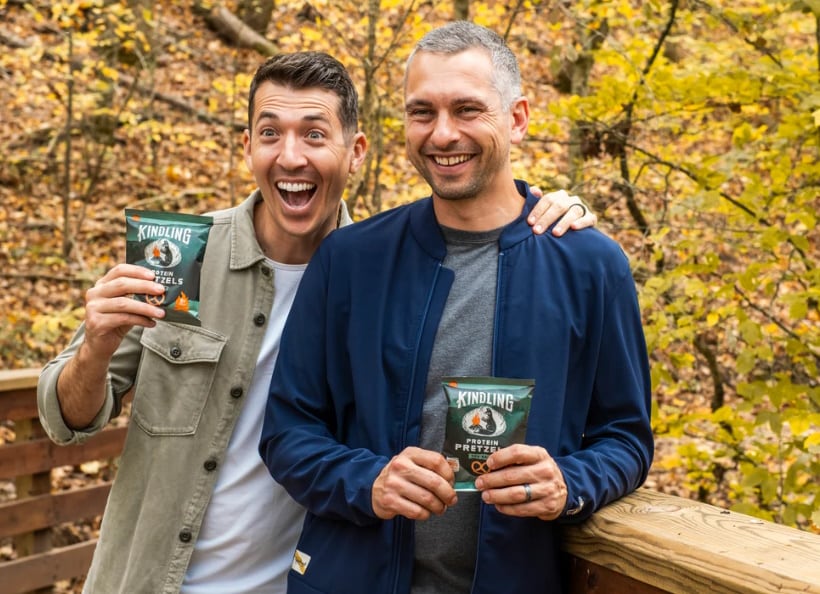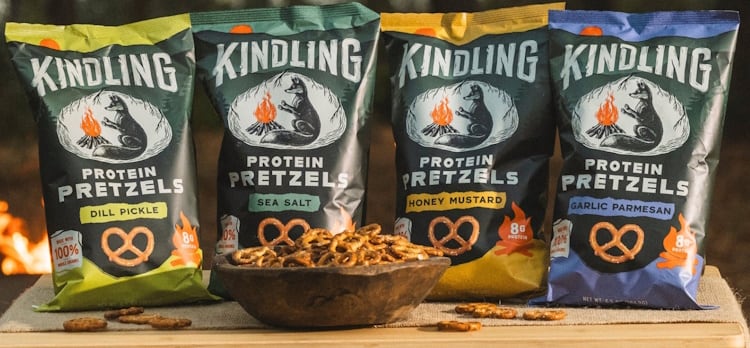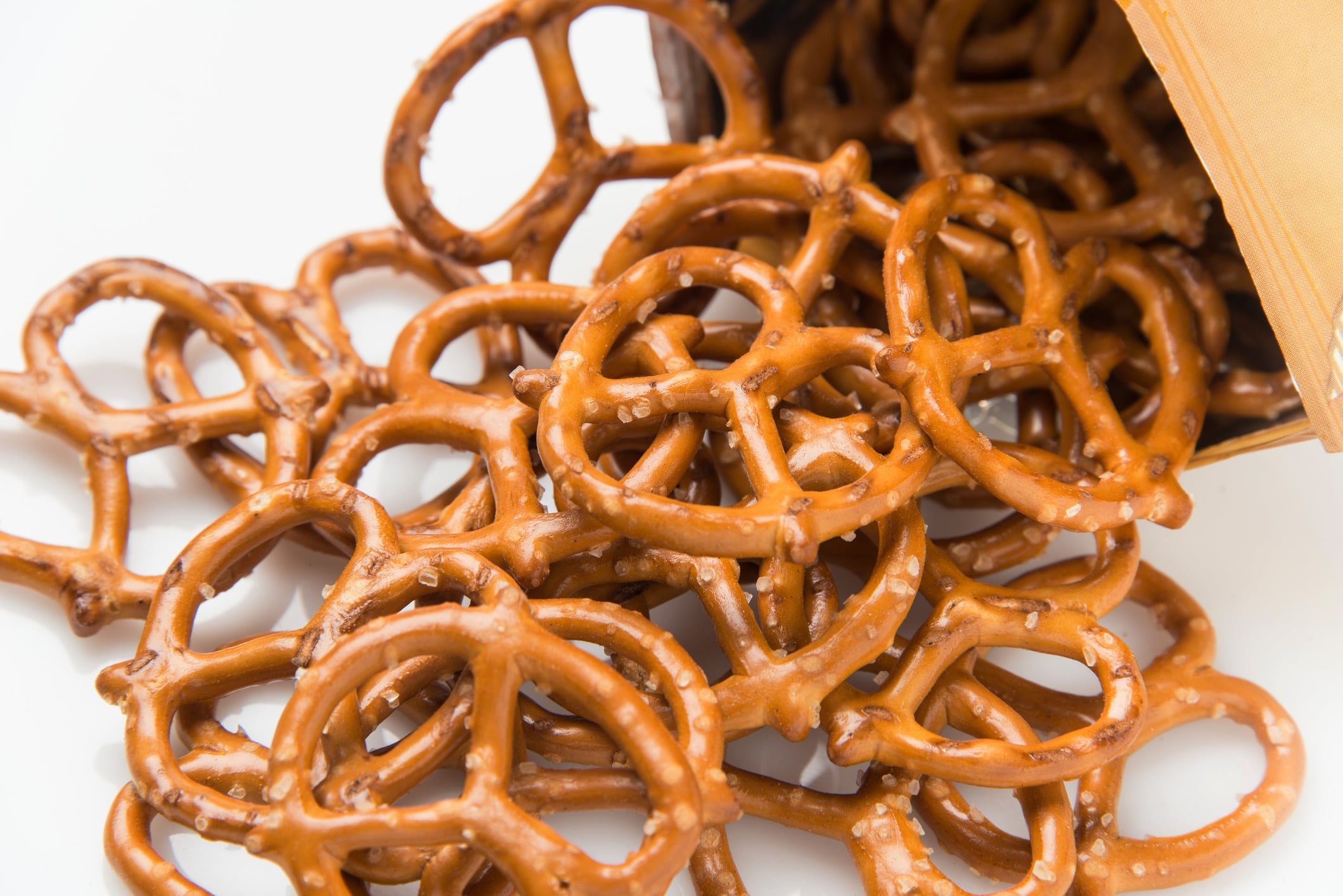Pretzels may be a snack aisle staple, but Kindling Snacks has given them a functional twist.
Founded in December 2024 by Smith and marketing lead Brandon Porras, the Nashville-based startup is already turning heads with its bold move: packing protein into pretzels.
Kindling’s pretzels deliver 8-9 grams of protein per serving, along with 3 grams of fibre and a base of 100% whole grains. Flavours like Sea Salt, Dill Pickle, Honey Mustard and Garlic Parmesan offer bold seasoning profiles without overpowering the pretzel’s familiar crunch. The snacks are made with expeller-pressed high oleic sunflower oil, which supports a balanced fat profile and delivers a clean, crispy finish. Sea Salt and Dill Pickle varieties are also vegan, and all products are non-GMO, kosher and made in a nut-free facility.
That strategy is already bearing fruit. Kindling doubled pretzel category sales on Amazon in its first month and has been gaining momentum at Costco roadshows. Smart timing, standout branding and a rising consumer demand for functional snacking have all played a role in its rapid start.
Americans have a notable fondness for pretzels, consuming approximately two pounds per person annually – that’s around 362 million pounds nationwide. This enthusiasm is particularly evident in Pennsylvania, often referred to as the Pretzel Belt, which produces about 80% of all pretzels made in the US. In Philadelphia, pretzel love runs even deeper: the average resident consumes about 12 pounds a year.
Combining this passion with the growing demand for high-protein snacks is a move that makes strategic sense. According to Euromonitor, one in six American adults replaced meals with snacks in 2024 - a sharp uptick that reflects how on-the-go lifestyles and changing eating patterns are driving the rise of protein-rich, better-for-you options. Globally, the protein snacks market is expected to hit $8.6 billion by 2032, with a CAGR of 8.7%, as per Persistence Market Research. Meanwhile, Mintel values the US snack bar segment alone at $8.9 billion in 2024, driven by Gen Z, Millennials and health-conscious parents seeking snacks that deliver both fuel and flavour.
And while the protein aisle is stacked with meat snacks, bars, bites and shakes, pretzels have mostly been left behind. That whitespace is exactly where Smith and Porras saw their opportunity and jumped in.

We caught up with Smith to chat about reinventing the humble pretzel, building on lessons from Kodiak and why the snack aisle still has room for disruption.
Q: Kindling saw big wins right out of the gate. What do you think clicked with consumers so quickly?
Smith: We worked hard to create a snack that delivers real nutrition while still tasting great. I think people have been surprised that it tastes just like a classic pretzel.
People want to eat better, but they don’t want to sacrifice taste. From early testing - especially with my kids - we knew that if it tasted good and was satisfying, people would come back for it. Our Amazon performance and success at Costco roadshows really confirmed we were onto something.
From pancakes to power plays
Founded in 1995 in Park City, Utah, Kodiak Cakes began as a family business selling whole-grain pancake mix based on a homemade recipe. The brand got its big break in 2014 after appearing on Shark Tank. Despite not securing a deal, the exposure catapulted Kodiak into the mainstream.
It found major success with a protein-rich Power Cakes line and expanded into oatmeal, waffles and snack bars. By 2020, it had hit $200 million in annual sales.
Today, Kodiak Cakes is a household name in the US breakfast and snack market, known for combining better-for-you nutrition with classic comfort food appeal.
Q: You helped build Kodiak Cakes into a household name. How did that experience shape your approach to Kindling? Anything you wanted to do differently this time?
Smith: At Kodiak, I got a front-row seat to building a brand from scratch. I was deeply involved across sales, marketing, ops and innovation, which helped me understand how to connect with consumers and disrupt the status quo.
It taught me how powerful it can be when you bring both taste and nutrition to the table. With Kindling, I wanted to take that same energy into the snack aisle, starting with something familiar – pretzels - but giving them a modern, functional twist.
Q: Pretzels and protein don’t usually go together. Why this concept?
Smith: It started in my kitchen in Nashville, when I was trying to find lunchbox-friendly snacks for my kids. Most options - aside from jerky - lacked both flavour and nutrition.
I wanted to make something better: real ingredients, a good dose of protein and something that actually satisfies. After a lot of trial runs and kid-approved testing, we landed on a crunchy, craveable pretzel that happens to be nutritious, too. Pretzels are a nostalgic, widely loved snack - so we thought, why not make them more functional?
Q: Let’s talk flavour. How did you land on your debut lineup?
Smith: Taste was never up for compromise. We wanted to make something people would reach for again and again. Dill Pickle, for instance, quickly became a fan favourite thanks to its bold, tangy bite.
I even bought a seasoning drum so I could test the blends myself in my kitchen - it had to be right. We’re growing fast, but not so fast that we lose sight of the core: great taste and great nutrition. All our pretzels use a whole grain and protein-enriched base to keep things balanced.
Q: How are consumers responding to your message around ‘snacking with purpose’?
Smith: The response has been really strong. Protein snacks are trending because people want to feel full and focused throughout the day. Whether you’re a parent packing lunches, someone using GLP-1s, or managing ADHD, we wanted Kindling to offer something that fuels you and tastes amazing.
But it’s also about the moments - camping trips, road trips, everyday adventures. We’re here for that, too.
Q: Every startup has its hiccups. What were the biggest challenges you faced in getting Kindling off the ground?
Smith: Turning an idea into something people can buy is never easy. We had to nail the pretzel’s taste, texture and colour, and then make sure the brand would connect with consumers and stand out on shelf.
One of the toughest parts early on was finding a manufacturing partner that could scale with us. We knew great partnerships would be key to doing this right.
Q: What’s next for Kindling?
Smith: We’re still just getting started. We’re working on new flavours and expanding into more retailers. Right now, I tell the team we’re in the planning, ploughing and planting phase. The harvest will come, but not just yet.
Q: You’ve done this before but the food industry is always shifting. What’s your best advice for other founders trying to make it in this space?
Smith: Stay observant. What worked a few years ago might not work now. But if you watch closely, you can learn a lot from the brands that are succeeding.
To borrow a line from Wayne Gretzky: ‘skate to where the puck is going, not where it is’.
Q: Any moments where things didn’t go as planned?
Smith: We’ve definitely stubbed our toes. When you’re moving fast, that’s inevitable. Sizing and pricing the packaging can be tough without much data.
Thankfully, we haven’t made any huge mistakes – yet - but we know they’ll come. The key is to keep your head up and keep moving forward.
Q: What’s your proudest moment so far?
Smith: Being part of the Kodiak journey and helping build that brand is something I’ll always be proud of. Seeing the team come together, stay focused and shake up multiple categories - those were some incredible moments.
Craveworthy with a cause

From his kitchen to Amazon’s bestsellers, Cameron Smith’s second act is shaping up to be just as influential as his first. With a clean label, expeller-pressed high oleic sunflower oil, whole grains and bold seasoning blends, Kindling is a snack that feels indulgent but functions like fuel.
In a protein-obsessed market hungry for fresh ideas, Kindling is proving there’s still room to twist the rules.


